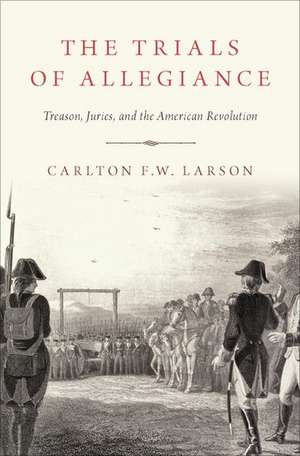The Trials of Allegiance: Treason, Juries, and the American Revolution
Autor Carlton F.W. Larsonen Limba Engleză Hardback – 13 oct 2019
Preț: 252.53 lei
Preț vechi: 292.39 lei
-14% Nou
Puncte Express: 379
Preț estimativ în valută:
48.34€ • 52.52$ • 40.63£
48.34€ • 52.52$ • 40.63£
Carte disponibilă
Livrare economică 18-24 martie
Preluare comenzi: 021 569.72.76
Specificații
ISBN-13: 9780190932749
ISBN-10: 0190932740
Pagini: 424
Ilustrații: 12
Dimensiuni: 239 x 155 x 38 mm
Greutate: 0.7 kg
Editura: Oxford University Press
Colecția OUP USA
Locul publicării:New York, United States
ISBN-10: 0190932740
Pagini: 424
Ilustrații: 12
Dimensiuni: 239 x 155 x 38 mm
Greutate: 0.7 kg
Editura: Oxford University Press
Colecția OUP USA
Locul publicării:New York, United States
Recenzii
It is hard to imagine a scholar of the Revolution offering something new and original, and even harder to imagine a legal scholar deploying non-printed legal and non-legal materials of such breadth. But Larson has done just that! In this fascinating and researched study, he explores how Pennsylvanians transformed the law of treason and helped create the republic. He surveys English legal inheritance, debates over the nature of treason, the predicaments of loyalism, and the role of juries, which exhibited leniency in a time of civil war. His masterful dissection of nearly two dozen jury trials prosecuted in Philadelphia in 1778 and 1779 - events almost completely ignored by prior historians—lays bare the promises and the perils of Americans' newfound liberty.
Larson's account of how the law of treason functioned during the Founding period will be an indispensable guide for anyone studying treason, allegiance, the jury, and the larger political context of this critical period in history.As Larson details in a series of fascinating stories, the complex struggles that informed how the Founding generation thought about such things before and after the American Revolution have important lessons for ongoing debates over these same matters.
The American Revolution and the formation of the early republic are well-studied, but Larson reveals something new: the central importance of treason law and prosecutions.In the Revolution, nearly every American-whether revolutionary, loyalist, or neutral - could be considered a traitor.Ideas about treason and treason prosecutions were and are fundamental to questions of sovereignty, allegiance, and national identity; Larson observes that the Declaration of Independence itself could be viewed as a clarification of what treason was and was not. Besides this new way of viewing the break with Britain, Larson's research gives us an unprecedented account of a crucial American institution in the eighteenth century: the jury.
In this marvelous study, Carlton Larson shows how traitors reflected on the meaning of treason and, in the process, forged a new national identity.
His book is much like a legal brief, with extensive footnotes (just under one hundred pages) and some charts focused on various cases in the colony of Pennsylvania before, during and just after the war. That it is well researched is obvious, and considering its content the book is quite well written and easy to read.
Larson's account of how the law of treason functioned during the Founding period will be an indispensable guide for anyone studying treason, allegiance, the jury, and the larger political context of this critical period in history.As Larson details in a series of fascinating stories, the complex struggles that informed how the Founding generation thought about such things before and after the American Revolution have important lessons for ongoing debates over these same matters.
The American Revolution and the formation of the early republic are well-studied, but Larson reveals something new: the central importance of treason law and prosecutions.In the Revolution, nearly every American-whether revolutionary, loyalist, or neutral - could be considered a traitor.Ideas about treason and treason prosecutions were and are fundamental to questions of sovereignty, allegiance, and national identity; Larson observes that the Declaration of Independence itself could be viewed as a clarification of what treason was and was not. Besides this new way of viewing the break with Britain, Larson's research gives us an unprecedented account of a crucial American institution in the eighteenth century: the jury.
In this marvelous study, Carlton Larson shows how traitors reflected on the meaning of treason and, in the process, forged a new national identity.
His book is much like a legal brief, with extensive footnotes (just under one hundred pages) and some charts focused on various cases in the colony of Pennsylvania before, during and just after the war. That it is well researched is obvious, and considering its content the book is quite well written and easy to read.
Notă biografică
Carlton F.W. Larson is Professor of Law at the University of California, Davis School of Law.
